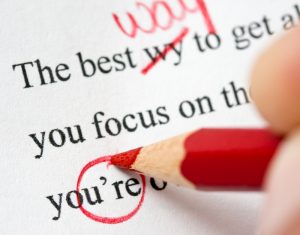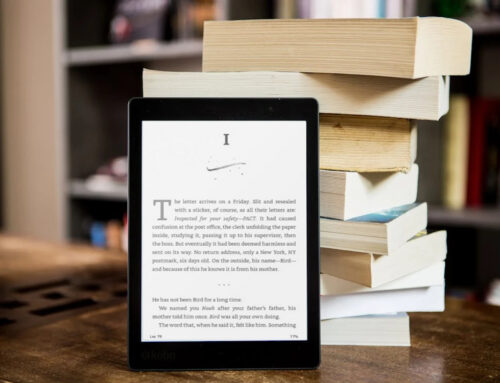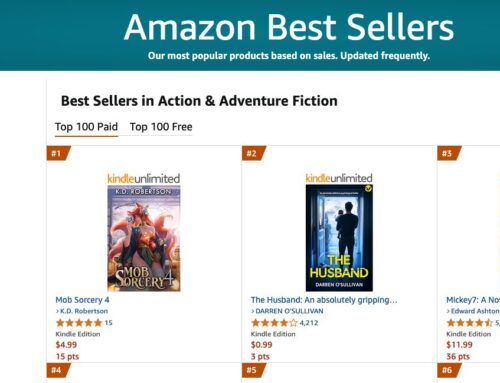 Over the past few weeks I have been concentrating on reading Kindle book files. I say concentrating because the urge to take out a red pencil and slash all the grammar, spelling, punctuation and capitalization errors is overtaking my urge to read. My eyes hurt. The worst ones are, sadly, self-published books. And I understand the issue…it is very hard to edit your own work. Some will tell you it is almost impossible.
Over the past few weeks I have been concentrating on reading Kindle book files. I say concentrating because the urge to take out a red pencil and slash all the grammar, spelling, punctuation and capitalization errors is overtaking my urge to read. My eyes hurt. The worst ones are, sadly, self-published books. And I understand the issue…it is very hard to edit your own work. Some will tell you it is almost impossible.
But most of these errors are correctable. And it sooooo distracts from the content of the book. It becomes almost impossible to read some passages as you read, then re-read and then read again and realize the author left out the word “not,” or used double negatives, or means her instead of he. And I am not discussing dialogue here. Dialogue sometimes has its own lingo, depending on the locale of the story. But if you are going to use dialects, then do your research and use it correctly. I had one book I just deleted because the dialogue was too difficult to read in the chosen dialect. It was very poorly done. If you don’t know it, don’t use it. But when it’s supposed to be English and it looks like pig Latin, you know someone was not proofreading their work.
People rely too much on the power of the word processor to correct most errors. That is so wrong. It is a machine, not AI. The machine does not know you mean their instead of there, or bailed instead of balled. The words are spelled correctly as far as the machine is concerned. But you know you didn’t mean “…and the girlfriend balled him out.”
Unless your aunt or sister is a schoolteacher, having a family member proofread your work is not going to do it. You can see in the acknowledgements at the front of the book “With many thanks to yadda-yadda, my cousin (or fill in the blank), for proofreading my work. Ya did a great job.” NOT! Sorry, but if the relative can’t tell the difference between here and hear, then they did not do such a great job, dude.
Then there is the Kindle formatting. Now, I know how to format a book myself. I’ve learned. But I am an IT freak and software is my game. But for the average person, this can be tricky. And when you see typefaces in 4 different font sizes in the same paragraph, you know they were having a hard time figuring out how to work the software. Or there are 4 blank pages between each chapter. Or everything becomes indented in the middle of the book. I’ve seen everything go Italic in the middle of a book and then to bold typeface near the end. And, of course, the pictures. Missing, too big, too small; yet the author references them and you need the picture. All these are due to not knowing how to use the word processing program well enough to correct these errors.
I cannot emphasize enough the need for self-publishing authors to seek out professional help in proofing their work. And that includes editing. If you are going to publish a book that references specifics, you need to make sure you are doing your fact checking correctly. That’s where an editor comes in. Editors will also tell you if you use something in the wrong manner or if the reference is incomplete, in error or outdated. I was reading the other day where a character was given a bunch of letters after their name to insinuate they were a psychiatrist. Well, the letters denoted he was a dentist. I was wondering why they brought a DDS in to interrogate a suspect.
While you might think the average reader will not notice such “little things,” truth is it should be a matter of pride in your work. Because you know someone is going to point out your major Faux Pas. And as a reviewer, I am not only going to knock off a star or two for bad proofing, editing and formatting, but I will mention it in the review I write. Why? Because it does make a difference, and it will be noticed and you should really care about what you are writing.
One of the reasons publishing houses take a large chunk of your book fees is because they proofread your work before they publish it. Now, granted, some publishing houses have crack editors and proofreaders. Others…well. Let’s just say I’ve seen some really sloppy editing on the part of some publishers, and have written them asking…did you do that on purpose or did you just not care?
In particular I remember where a biography was done and except for the title on the book cover, the subject of the bio had their name misspelled throughout the entire work. Someone had the window pop up in the spellchecker that said “this word is spelled wrong, suggesting…” and they hit the “OK, change all” button. It went to press wrong. And everyone noticed it right away – Amazon was flooded with reviews about the misspelled name. How many times have you hit the change button without look at what you are changing? We all do it, don’t feel bad. But that’s what a proofreader gets paid to catch.
But back to self-publishing: poorly formatted and proofread work is going to affect the sales of your book, if you want to come right down to the bottom line. I have seen some author complain about poor sales and then someone comments “well, if your work was readable, it might sell better.” You have to love Facebook for the raw comments if nothing else.
Look into the numerous proofreading firms out there. Actually LOOK at the Kindle copy of your book and see how it came out AFTER Amazon converted it. If it looks funky, chances are it will look funky to everyone and you should get help to reformat it.
One more side note – cover art. I’ve seen all sorts of “Kindle Art” for books. That Fire just came out and presents color to the public now is probably a great thing. But I have a black and white Kindle and I would guess at this point so do many others. Have you looked at your cover art in a black and white Kindle? Some of it is scary! If you don’t have a Kindle, the reader software is free and you can install it on your home PC. Read your book in a Kindle and see what it looks like BEFORE you load it into Amazon.
If you are not sure, then you should get a proofreader. And check your formatting. Present a professional appearance. You are going to make more money if you present a professional appearance. I can almost guarantee it. Of course, a good story always helps.
Get an Editorial Review | Get Amazon Sales & Reviews | Get Edited | Get Beta Readers | Enter the SPR Book Awards | Other Marketing Services






















And yet you mis-spelled “locale”…:-)
See what I mean… you just can’t do it by yourself. Someone has to go in and look it over for you. Thanks. I’ll see about correcting that bit… lol.
Fixed. I guess that was my fault b/c I proofread this.
I proofread my own stuff and usually get hubby to go over it again, but didn’t. And I missed a word.. lol. Sok, Henry, You done good! 9-)
Boudica, you have taken the words out of my mouth. And nowadays when we say them, someone will inevitably accuse us of pedantry. But it’s a matter of not wanting to confuse the person who is most important to a writer: the reader. As a reader, I intensely dislike having to go through a sentence or paragraph five or six times before I realize the author has made yet another mistake. If I didn’t care whether one character bailed or balled another character, I wouldn’t care enough to read their story.
Thank you for this well-written article in defense of my profession. (Notice the hyphen in “well-written,” by the way, per CMOS 7.85.)
For self-publishers who have trouble affording proofreaders and copyeditors, please consider visiting my website. I am offering low rates as I get my freelance business off the ground. I am currently employed as a proofreader at a direct mailing company, and I am pursuing a copyediting certificate through the University of California. I can correct grammar and punctuation errors, catch incorrect words (such as “balled”), and comment on overall organization and flow. The self-publisher that I am currently working with has been impressed with my ability to provide helpful comments on content and structure.
Please contact me for a quote. You can email me at meganwengerediting@gmail.com or visit my website at mwediting.wordpress.com.
I could not agree with you more. When I decided to self-publish the first thing I did was hire an editor. And even with that, after everything was said and done I am sure there are a few mistakes to uncover. The formatting was also something I outsourced. I have read many electronic versions of books by Big Six Houses that got it all wrong and it makes for a very unpleasant read.
The last point I want to make is that if you want to be taken seriously as a author and choose to self-publish, it is critical to get these things right. They are the first things critics of the self-publishing industry take a stab at. It’s up to us as self-published authors not to give them anything to work with
I’m pretty experienced at formatting but my Kindle book (CreateSpace) had a lot of mysterious, seemingly random paragraphs with strange indents. Also have seen this same thing crop up in many other indie books, including a few successful ones I sought out (cause, well, they were successful). Looked into it and followed a CreateSpace guideline for converting to an html file before uploading. It was quite easy and eliminated the problem completely.
As for proofreaders(I recently got a good review here but was docked one for numerous easy-to-fix typos, fair enough)I agree 100 percent but even a cheap one would have quadrupled my overhead, which I simply could not afford as an out-of-work journalist. I assume many other writers have looked at the prices for proofreaders and said the same thing. And in my case, while aware how hard it is to proofread your own stuff, given I have 22 years of experience as a copy editor, my worry was I’d be paying good money for someone who was less qualified than me. So it’s not always about pride in work. We all do the best we can. At $3.99 (or often less), I think people can and should accept a few flaws (typos, anyway, not overtly bad grammar, punctuation and formatting). There’s a saying that an artist never finishes his work, he merely abandons it. That’s what I did because it was time to get it out there. If it sells, I can afford to go back, put a proofreader on it and update the Kindle file (nice feature, that). But until then, it’s just not a responsible expenditure … and on to the next book.
And I agree with you, William. I have a few flaws in my own works as well. I can’t afford a proofreader and we do the best we can given the budget we have to work with. On the other hand, if I find myself re-reading someone’s work to try to make sense of it, they obviously need someone else to proof their work. And there are options for that, like using spell checker?? Yes, the errors are so bad with some of them, they had to have forgotten to turn on the spell checker.
I can forgive minor issues with a self-published author.
I agree, Boudica, the problem is “re-reading someone’s work to try to make sense of it….” It isn’t the minor issues like “it’s” for “its,” or even “that” for “who,” when the very core of myself as a human being tells me only “who” will do. If I can easily understand what the writer is saying, that’s all that matters. The idea, not the writing,should give me pause.
Let me add: the idea needs to be nothing more than a well-written sentence.
As an indie writer, I’ll say that I have yet to use a professional editor’s services because I can’t afford it. However, I am well aware of the stigmata associated with self-published works and I do my damn best to make my books look fantastic. However, despite my opinion, you always need somebody else’s too, so my next book, my first kindle only release, will meet the gaze of a professional editor. I might be able to afford it now.